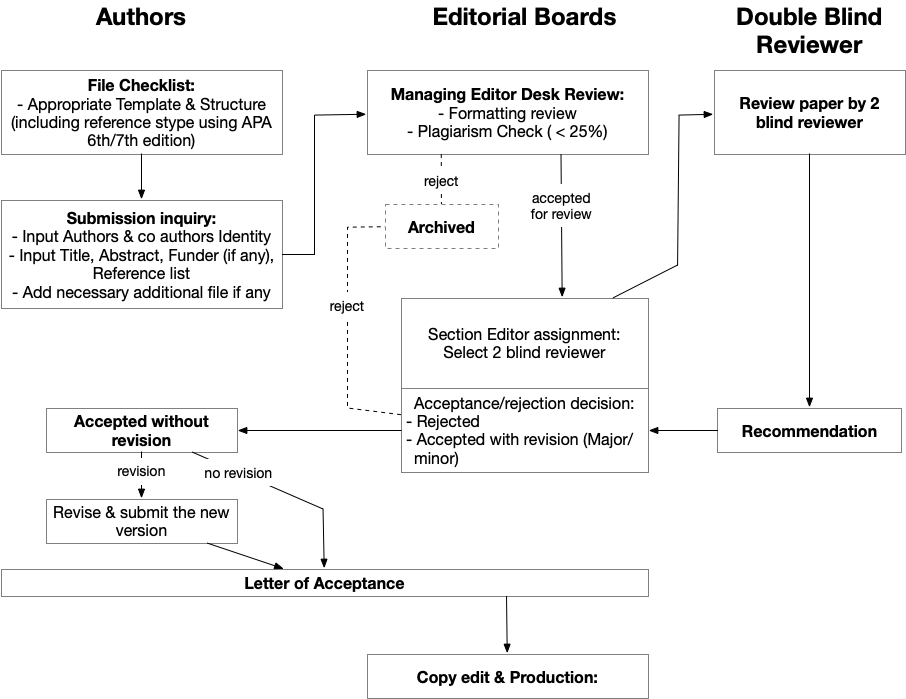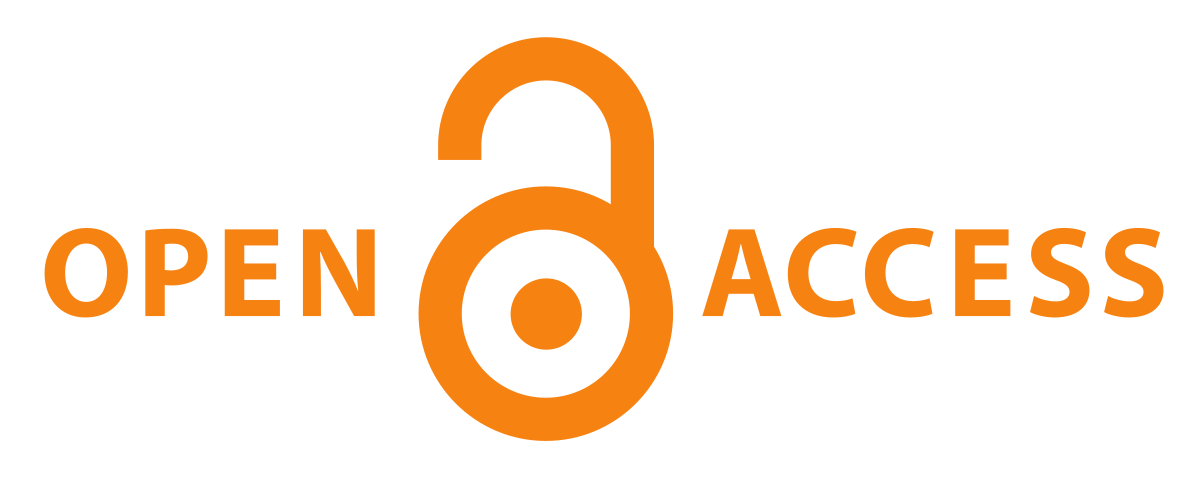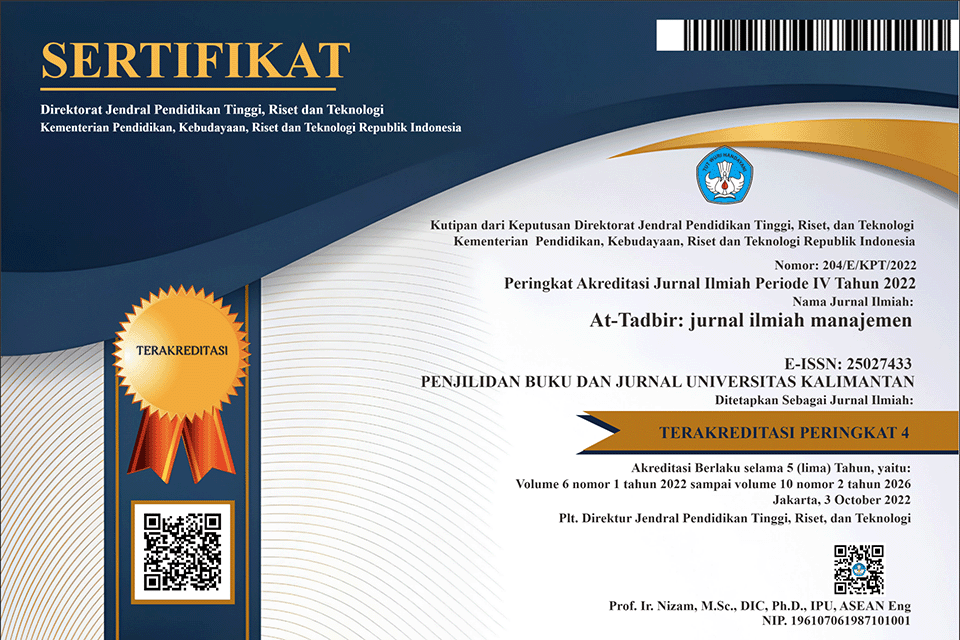- Focus and Scope
- Section Policies
- Peer Review Process
- Publication Frequency
- Open Access Policy
- Archiving
- Publication Ethics
- Plagiarism
- Reference Manager
- Journal Fee
- CC License
- Frequently Asked Question
Focus and Scope
At-Tadbir: Jurnal Ilmiah Management aimed to disseminate research, conceptual frames and scientific idea within the fields of business management and business administration. Specifically, the scope of the journal is in the following list (but not limited to):
1. Human resource management
2. Financial Management and Accounting
3. Marketing Management and Consumer Behavior
4. Operation Management and Logistics
5. Management of Information Systems and User Behavior
6. Strategic Management
7. Islamic Issues related with Management
We also accepts articles in any business related subjects and any research methodology that meet the standards established for publication from academicians, graduate students, practitioners, and others interested in business research.
Section Policies
Artikel
Peer Review Process
Each of article in this journal will pass through several phases including:
1. Initial desk review to ensure technical requirements according to journal policy
2. The appropriate article will be assigned to two reviewers using the Double-blind review process.
3. Reviewer A & B submit their review and suggested a decision regarding the article.
4. The editor submits the results of the assessment and recommendation to the author along with the deadline for revision.
5. The re-submitted article is being processed to the ready to publish Galley.
6. Publishing the article online into assigned issues.
Publication Frequency
At-Tadbir:Jurnal Ilmiah Manajemen is a biannual scientific publication with the following schedule:
No 1: January - June
No 2: July - December
Open Access Policy
This journal provides open access which, in principle, makes research freely available to the public and will support the largest global exchange of knowledge.

Archiving
OJS LOCKSS system functions as a distributed filing system between libraries that use this system with the aim of making permanent archives (for preservation and restoration). Continue...
Publication Ethics
Our ethic statements are based on COPE’s Best Practice Guidelines for Journal Editors.
Publication decisions
The editor is responsible for deciding which of the articles submitted to the journal should be published.
The editor may be guided by the policies of the journal's editorial board and constrained by such legal requirements as shall then be in force regarding libel, copyright infringement and plagiarism. The editor may confer with other editors or reviewers in making this decision.
Fair play
An editor at any time evaluate manuscripts for their intellectual content without regard to race, gender, sexual orientation, religious belief, ethnic origin, citizenship, or political philosophy of the authors.
Confidentiality
The editor and any editorial staff must not disclose any information about a submitted manuscript to anyone other than the corresponding author, reviewers, potential reviewers, other editorial advisers, and the publisher, as appropriate.
Disclosure and conflicts of interest
Unpublished materials disclosed in a submitted manuscript must not be used in an editor's own research without the express written consent of the author.
Duties of Reviewers
Contribution to Editorial Decisions
Peer review assists the editor in making editorial decisions and through the editorial communications with the author may also assist the author in improving the paper.
Promptness
Any selected referee who feels unqualified to review the research reported in a manuscript or knows that its prompt review will be impossible should notify the editor and excuse himself from the review process.
Confidentiality
Any manuscripts received for review must be treated as confidential documents. They must not be shown to or discussed with others except as authorized by the editor.
Standards of Objectivity
Reviews should be conducted objectively. Personal criticism of the author is inappropriate. Referees should express their views clearly with supporting arguments.
Acknowledgement of Sources
Reviewers should identify relevant published work that has not been cited by the authors. Any statement that an observation, derivation, or argument had been previously reported should be accompanied by the relevant citation. A reviewer should also call to the editor's attention any substantial similarity or overlap between the manuscript under consideration and any other published paper of which they have personal knowledge.
Disclosure and Conflict of Interest
Privileged information or ideas obtained through peer review must be kept confidential and not used for personal advantage. Reviewers should not consider manuscripts in which they have conflicts of interest resulting from competitive, collaborative, or other relationships or connections with any of the authors, companies, or institutions connected to the papers.
Duties of Authors
Reporting standards
Authors of reports of original research should present an accurate account of the work performed as well as an objective discussion of its significance. Underlying data should be represented accurately in the paper. A paper should contain sufficient detail and references to permit others to replicate the work. Fraudulent or knowingly inaccurate statements constitute unethical behavior and are unacceptable.
Originality and Plagiarism
The authors should ensure that they have written entirely original works, and if the authors have used the work and/or words of others that this has been appropriately cited or quoted.
Multiple, Redundant or Concurrent Publication
An author should not in general publish manuscripts describing essentially the same research in more than one journal or primary publication. Submitting the same manuscript to more than one journal concurrently constitutes unethical publishing behaviour and is unacceptable.
Acknowledgement of Sources
Proper acknowledgment of the work of others must always be given. Authors should cite publications that have been influential in determining the nature of the reported work.
Authorship of the Paper
Authorship should be limited to those who have made a significant contribution to the conception, design, execution, or interpretation of the reported study. All those who have made significant contributions should be listed as co-authors. Where there are others who have participated in certain substantive aspects of the research project, they should be acknowledged or listed as contributors.
The corresponding author should ensure that all appropriate co-authors and no inappropriate co-authors are included on the paper, and that all co-authors have seen and approved the final version of the paper and have agreed to its submission for publication.
Disclosure and Conflicts of Interest
All authors should disclose in their manuscript any financial or other substantive conflict of interest that might be construed to influence the results or interpretation of their manuscript. All sources of financial support for the project should be disclosed.
Fundamental errors in published works
When an author discovers a significant error or inaccuracy in his/her own published work, it is the author’s obligation to promptly notify the journal editor or publisher and cooperate with the editor to retract or correct the paper.
Plagiarism
This journal applies a plagiarism check system with the help of Plagiarism Plagiarism Checkcer software (iThenticate). The stages of plagiarism check are as follows:
1. Check plagiarism is done at the beginning of the review stage in the editor
2. Plagiarism checks must be under 25%
3. Plagiarism results that exceed the Cut-off value must be corrected to the same as the cut-off value.
4. The un improved manuscript as required by editors is potentially rejected.

Reference Manager
This journal uses the APA 6th edition citation style. It is recommended to use citation management tools such as MENDELEY, ZOTERO, END-NOTES, and similar software
Journal Fee
- At-Tadbir: Jurnal Ilmiah Manajemen does not charge to the Article Submission: 0.00 (IDR),
- At-Tadbir: Jurnal Ilmiah Manajemen Accepted paper need to Pay The Article Publication fee: IDR 300,000
- Fast-Track Review: Additional IDR 300,000
- We Provide Waiver for international collaboration author (IDR 0.00)
CC License
At-Tadbir: Jurnal Ilmiah Manajemen is licensed under Creative Commons Attribution-Share A like 4.0 International License
Frequently Asked Question
Q: How long the review will take a place?
A: The review process will take about 2 - 4 Weeks on reviewer sides. Please note that we cannot assure the exact time. But, we will periodically remind the reviewer.
Q: When can the LOA (letter of acceptance) be issued?
A: The Letter of acceptance will be issued after the revised version from the author has received by the editorial team. please refer to the peer review process. The approximate time of LOA issuance is one week after the revised version has been submitted.
Q: How long will it takes from first submission to Acceptance (LOA)?
A: Based on the OJS reports the submission to publication time is approximately within 1-4 months. However, the more shorter time in fast-track publication is within 4 - 6 weeks. Please note that the the LOA is issued only if article is accepted as indicated in peer review process.
Q: How if there is no response from the author
A: We will periodically remind the author to response by sending reminder email 3 times. If there is no response from the author, the editorial team will withdraw the manuscript from the publication processing. Please refer to the COPE topics below:




